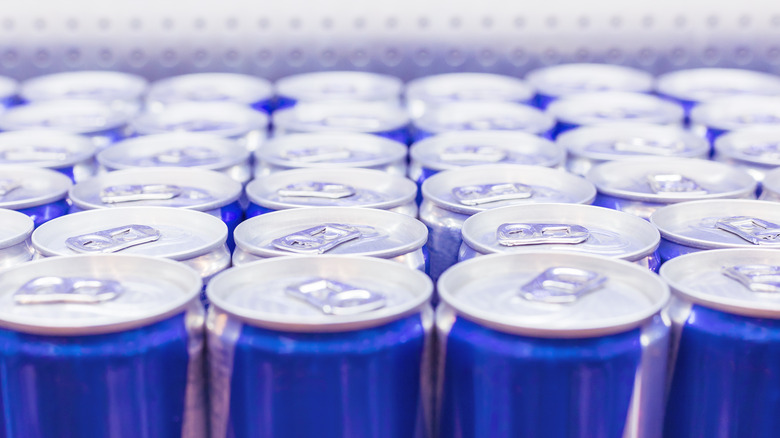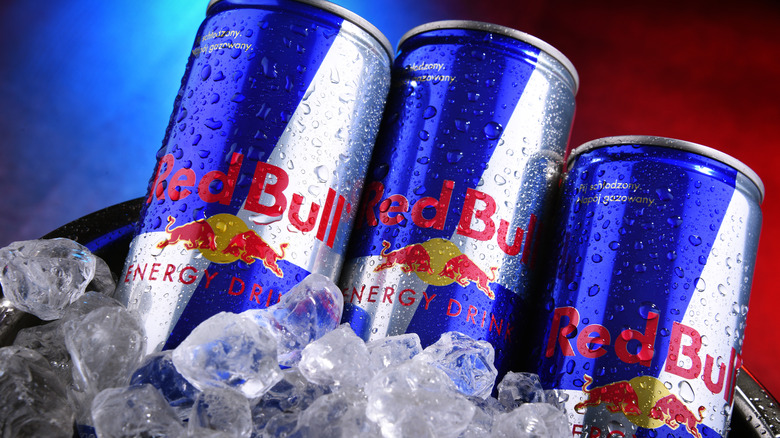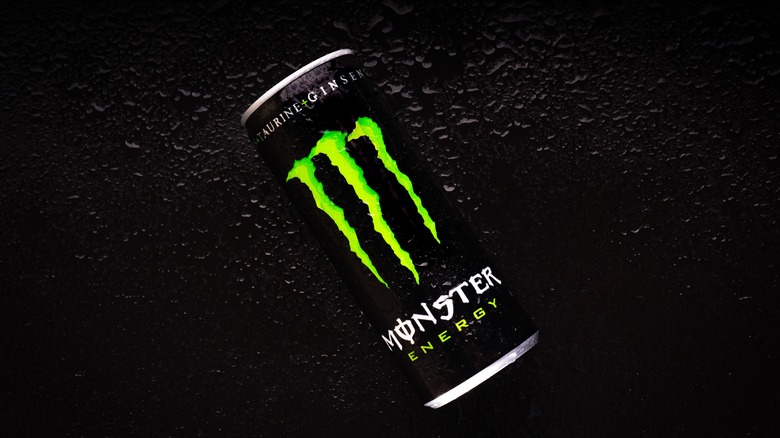Why It's So Important To Check Your Energy Drink Labels
In a world that's seemingly becoming more fast-paced with each passing day, many of us have turned to the quick buzz of an energy drink to keep us going. What college student hasn't cracked open a Red Bull to grind through an all-nighter? Who hasn't found themselves on a long drive and, finding comfort in a gas station, gotten a shot of 5-Hour Energy to jolt them awake? If you need energy — and you need it now — grabbing a can of whatever "hardcore" or "x-treme"-sounding energy drink will have you wide-eyed and alert for whatever you need to do.
But just as energy drinks can provide us the jolt we need, they can also have severe drawbacks. In fact, the very thing they promise can actually be more of a health hazard than it is helpful. The Takeout warns that, before you toss a can of Monster Energy or Bang! energy drink into your grocery cart, you should take time to look at the labels to be sure just how much caffeine you're actually drinking. This is certainly nothing to ignore, considering that certain energy drinks can contain up to 400mg of caffeine in a single can (via Caffeine Informer). In comparison, Reader's Digest tells us that your average cup of coffee can have anywhere between 70-200mg of caffeine, with 95mg being the general average.
In short, you get a lot of caffeine from those gas station energy drinks.
What is a caffeine addiction?
Now, you can argue that an energy drink has a lot more caffeine than any cup of coffee because that's what an energy drink is supposed to have, considering that it's meant to give you energy. If you're paying for a lot of energy, you'd probably want a lot of caffeine to do the trick. While it's true that having one can of Red Bull isn't going to kill you, sure, you should always take your energy drinks in moderation.
According to Cleveland Clinic, caffeine can be an addictive substance, just the same as nicotine. Extreme amounts of caffeine can affect your central nervous system, alongside helping to release dopamine — that "feel-good" energy chemical in your brain. The more caffeine you consume, the more your body starts to rely on getting caffeine to operate properly. When someone who has such an addiction goes without caffeine, they may experience headaches, exhaustion, difficultly concentrating, nausea, muscle pain, and irritability.
Fortunately, Addiction Center tells us that most symptoms of caffeine addiction can be treated by simply weening oneself off of caffeine. After a period of seven to 12 days, as your body slowly begins to readjust itself to lower levels of caffeine, symptoms will begin to disappear. Of course, this requires some discipline and support on the part of the individual, and may involve lowering their caffeine intake slowly rather than stopping outright.
The fatal consequences of too much caffeine
While the worst things that can happen to an individual who overindulges in caffeine are symptoms of insomnia and nervousness, there have been cases where consuming extreme amounts of energy drinks have lead to fatal consequences.
According to Gizmodo, a young man in the United Kingdom back in 2021 had developed a habit of consuming an average of four energy drinks per day. This unhealthy habit eventually lead to the man being diagnosed not just with kidney failure, but heart failure — something that had almost taken his life without medical intervention. In 2022, The Mirror tells us, a young boy in Mexico suffered a fatal heart attack, supposedly caused by the youth consuming a can of Monster Energy too quickly. Heart Foundation spokesperson Hannah Drake tells the New York Post that these over-caffeinated drinks may be partly responsible for heart conditions in many young individuals.
Of course, please keep in mind that none of this is meant to shock or disturb you, or try to smear any energy drink companies. Rather, all of this is simply to tell you that, while an energy drink every now and then is nothing to be ashamed of, it's always best to keep it in moderation and focus on natural, healthier ways to increase one's energy. Don't forget to check the label to see how much caffeine you're drinking!


